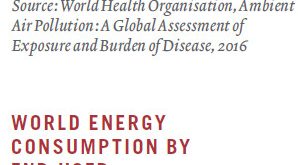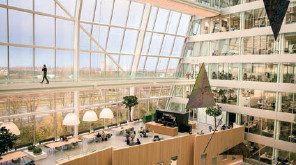Investment in the transition to clean energy is being driven by innovation, the improved economics of renewables and energy storage, health concerns about rising air pollution, and government regulation to reduce energy consumption and emission.It was in 2007 that Pictet launched a strategy that focused on renewable energy which was then fashionable but not cost-effective in comparison with more traditional sources. However, the strategy has changed considerably and is now much broader and...
Read More »Sustainable offices for the cities of the future
An office building in Amsterdam has been designed as a zero-carbonbuilding that occasionally generates more power than it consumes and uses a host of smart technologies to create adaptable and intelligent workspaces.Just under a third of the world’s energy is consumed by buildings that are responsible for about a fifth of global greenhouse gas emissions, according to the International Panel on Climate Change. More worrying, their use of energy could double or even treble by 2050, as billions...
Read More »Freeing agriculture from climate slavery
Research at MIT’s Media Lab is analysing the climates and environmental conditions that produce the most tasty and nutritious foodstuffs, with the aim of replicating them anywhere in the world – including in fast-growing cities.The Media Lab at the Massachusetts Institute of Technology is not an obvious place to launch a revolution in agriculture. But since it describes itself as an ‘antidisciplinary research lab’ working to reinvent a long list of human activities by the application of...
Read More »Interview with Peter Frankopan
The eminent Oxford historian says that there is nothing new about globalisation, which began as much as 3,000 years ago. A key moment was when Alexander the Great’s conquests connected three continents and opened trading routes between the great cities of antiquity. What was the role of Alexander the Great in globalisation? His conquests between 334 and 323BC drew together North Africa, Europe and Asia and created what could fairly be called a global exchange system. Coins minted by his...
Read More »Building a smart and equitable city
When Bill de Blasio was elected New York’s mayor in 2013, he launched the Mayor’s Office of Technology and Innovation to raise the quality of the city’s infrastructure, education system and workforce for the digital era.The Office’s mission statement was to deploy digital technologies to improve the city’s services, but also to use them to develop its economy and create more opportunities for all New Yorkers. One of its first tasks was introducing free-of-charge kindergartens for all...
Read More »Singapore grows sky-high greens
An engineer has devised a vertical farming system to grow green vegetables for the densely populated city-state, using very little water or energy and producing ten times the output per hectare of traditional cultivation methods.As the world’s population continues to grow and move into urban areas, feeding people in cities is recognised as a big challenge. Land is a precious commodity that is often threatened by over-farming, fertilisers pollute waterways, and chemicals to control pests and...
Read More »The future of cities
The digital revolution has launched a wave of innovation in the world’s cities, says MIT’s Carlo Ratti, providing opportunities to improve urban mobility and create better workspaces for the changing nature of work. These are exciting times for cities, according to Carlo Ratti, Director of MIT’s Senseable City Lab and co-founder of Carlo Ratti Associati architecture studio. Although they occupy just 2 per cent of the...
Read More »The future of cities
The digital revolution has launched a wave of innovation in the world’s cities, says MIT’s Carlo Ratti, providing opportunities to improve urban mobility and create better workspaces for the changing nature of work.These are exciting times for cities, according to Carlo Ratti, Director of MIT’s Senseable City Lab and co-founder of Carlo Ratti Associati architecture studio. Although they occupy just 2 per cent of the Earth’s surface, they are home to more than half the world’s population,...
Read More »Endless power for cities from the oceans
Two entrepreneurs have developed a simple technology that can generate renewable energy from ocean waves at a price that is competitive with solar power – attracting interest from cities all over the world.More than a billion people live without electricity, mostly in developing countries. Their cities often have access to electricity, but emissions from power plants create high levels of air pollution, which expose their inhabitants to health risks. And bills for imported fuels are rising...
Read More »The role of cities in the global economy
The Executive Director of the UN Human Settlements Programme describes the reasons why more than half the world’s population has moved into cities and the challenges that need to be confronted to reap the benefits.For almost all of human history, people have lived in small towns, villages or the countryside. But the proportion of the world’s population living in cities has rapidly grown over the last two centuries, from 5 per cent in 1800, to 13 per cent in 1900 and 34 per cent by 1960. In...
Read More » Swiss Economicblogs.org
Swiss Economicblogs.org









